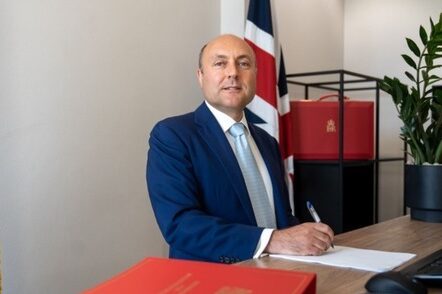UK Minister Details New Government Funding for LEO Innovations

Andrew Griffith, UK Minister of State for the Department for Science, Innovation and Technology
The UK government has made 60 million pounds ($75.8 million) available for innovations to boost the nation’s satellite communications sector. This is part of a 160 million pound ($202 million) total investment over the next four years in the UK Space Agency’s (UKSA) Connectivity in Low Earth Orbit (C-LEO) program. The first funding call launched late last week.
Via Satellite spoke to Andrew Griffith, Minister of State for the Department for Science, Innovation and Technology (DSIT) in the U.K. about the significance of this funding. He called it a “banner” moment for the U.K. space industry.
“The space economy is burgeoning generally and not just in the narrow domains of launch and exploration, but also communication,” Griffith said. “There is a realistic prospect of ubiquitous broadband from space, mobile connectivity through 5G, 6G and other flavors of G. This is an exciting moment in time.”
The DSIT is a new department established in 2023, and one of its tasks is helping the space industry make the most of its potential. The department is set to reach 20 billion pounds ($25 million) per year in funding for research, development, and innovation next year. Griffith said the funding gives DSIT the capacity to invest more in space, especially in sovereign U.K. space missions.
“We are keen to use that to keep advancing communications, in particular. Satellites are a strong area for us. We have ambitions and capabilities across the piece. But, one of the first things that people say is that the U.K. seems pretty good at satellites, and so this C-LEO fund is all about that,” he said.
The new funding can be used for research and development projects to build the capabilities of satellite constellations, making them more efficient at processing data in space and improving the services they offer to customers on Earth.
One of the particular challenges is helping small- and medium-sized enterprises in the U.K. space sector. No company or consortia can gain more than 25 million pounds ($32 million) of the funding to ensure that many benefit.
“From an industrial policy perspective, I want to broaden and deepen the UK supply chain. We have a number of brilliant companies operating in the U.K,” Griffith said. “The SMEs often survive hand-to-mouth, feast-to-famine. So, if we can put more work their way on a competitive basis, I would be happy with that. We would like to see a number of companies and consortia benefit.”
Advancing these communications services is seen as critical to the success of emerging innovations – such as autonomous vehicles and healthcare deliveries via drone – and the U.K. government hopes this will ultimately give the U.K. space sector a competitive edge in the rapidly growing global market of LEO constellations. It hopes it will help catalyze investment, develop new manufacturing capabilities, and drive the improvement of connectivity in remote, rural and harder-to-reach areas in the U.K. and beyond.
Griffith said he wants to create a space ecosystem through the Space Council and is working with the Minister for Defence Procurement on this.
“I do want to try and create an environment where there is more systemic and predictability about the potential revenues that could flow to U.K. space companies. That is the number one thing they tell me they need when they think about growing. You can’t grow when there is one big contract coming up and then that drops away. We need to have more steady, reliable support for the industry through the UK Space Agency,” he said.
Griffith said the prime job of the government is to build clarity and confidence in this arena. In recent years, the U.K. government released a National Space Strategy and established a Space Council to coordinate on the strategy. The nation also published a Space Industrial Plan.
Griffith previewed an upcoming space skills document, and a space regulatory strategy.
“In terms of how you build confidence and clarity, I think those documents will go some way towards that,” he said. “We have announced support for the SaxaVord launch site in the last budget. We are here and we are serious and money is flowing. It will take awhile for that to flow through, and that is systemic, but that is my ambition.”
[Read more: UK Space Agency Lead Emphasizes National Priorities at Space-Comm Expo]